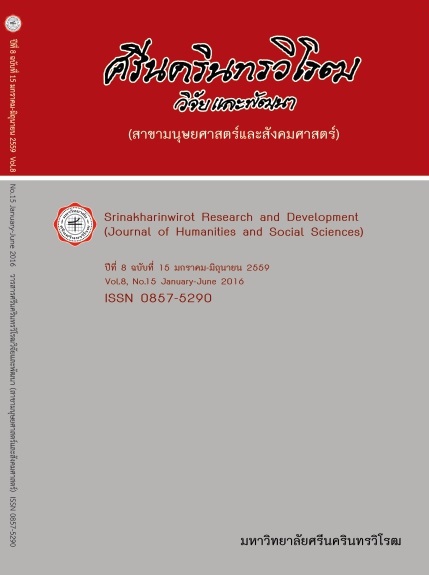ผลของโปรแกรมการปรับเปลี่ยนพฤติกรรมการดูแลอนามัยช่องปากของวัยรุ่นตอนต้น THE EFFECT OF BEHAVIORAL MODIFICATION PROGRAM ON ORAL HYGIENE CARE BEHAVIOR OF EARLY ADOLESCENTS
Keywords:
พฤติกรรมการดูแลอนามัยช่องปาก โปรแกรมการปรับเปลี่ยนพฤติกรรม วัยรุ่นตอนต้นAbstract
บทคัดย่อ
การวิจัยเชิงทดลองครั้งนี้ มีวัตถุประสงค์เพื่อศึกษาประสิทธิผลของโปรแกรมปรับเปลี่ยนพฤติกรรม
การดูแลอนามัยช่องปากของวัยรุ่นตอนต้น กลุ่มตัวอย่าง คือ นักเรียนชั้นมัธยมศึกษาปีที่ 1 ในโรงเรียนนำร่อง จังหวัดนครนายก จำนวน 94 คน ระหว่างเดือน กุมภาพันธ์ – พฤษภาคม พ.ศ. 2557 โดยทำการสุ่มอย่างง่าย เข้ากลุ่มทดลองและกลุ่มควบคุม กลุ่มทดลองจำนวน 48 คน ได้รับโปรแกรมการปรับเปลี่ยนพฤติกรรมการดูแลอนามัยช่องปากที่ประยุกต์มาจากแนวคิดการปรับเปลี่ยนพฤติกรรมและทฤษฎีเรียนรู้ปัญญาสังคม และกลุ่มควบคุมจำนวน 46 คน ได้รับทันตสุขศึกษาแบบกลุ่มแบบปกติ เครื่องมือที่ใช้ในการเก็บรวบรวมข้อมูล คือ แบบตรวจฟันและแบบสอบถามมาตรวัดประมาณค่า 6 ระดับ มีค่าความเชื่อมั่นอยู่ระหว่าง .63 - .78 วิเคราะห์ข้อมูลด้วยสถิติวิเคราะห์ความแปรปรวนร่วม วิเคราะห์ความแปรปรวนร่วมพหุตัวแปร วิเคราะห์ความแปรปรวนพหุตัวแปร ผลการวิจัย พบว่า นักเรียนที่ได้รับโปรแกรมการปรับเปลี่ยนพฤติกรรมการดูแลอนามัยช่องปากของวัยรุ่นตอนต้น จะมีการทำความสะอาดช่องปาก การบริโภคอาหารเพื่ออนามัยช่องปาก และสภาวะอนามัยช่องปากดีกว่านักเรียนที่ไม่ได้รับโปรแกรมอย่างมีนัยสำคัญทางสถิติ (p<.05) และไม่พบปฏิสัมพันธ์ระหว่างตัวแปรจิตสังคมกับรูปแบบการฝึกอบรมที่มีต่อการทำความสะอาดช่องปาก การบริโภคอาหารเพื่ออนามัยช่องปาก และสภาวะอนามัยช่องปาก
Abstract
The objectives of this experimental research was to examine the effectiveness of behavioral modification program on oral hygiene care behavior of early adolescents. The sample of this study was 94 grade 13th students in pilot school of Nakorn-Nayok Province (Feb – May, 2014), who was selected by simple random sampling and assigned to an experimental group and control group. In experimental group, 48 students participated in behavioral modification program that applied from behavioral modification theory and social learning cognitive theory on oral hygiene care behavior. In control group, 46 students participated in group oral hygiene instruction. Data Collection was conducted by oral hygiene examination sheet and 6-point scale questionnaires. The reliability of each measure ranged from .63 to .78. Data were analyzed by MANCOVA, ANCOVA and MANOVA. The result was showed that students who participated in the oral hygiene care behavioral modification program for early adolescence had better brushing behavior, eating behavior and oral hygiene status than the control group (p<.05). No significant interaction between psychosocial variables and model training that effected on brushing behavioral, eating behavioral and oral hygiene status was found.Downloads
Downloads
Published
How to Cite
Issue
Section
License
Srinakharinwirot Research and Development Journal of Humanities and Social Sciences is licensed Under a Creative Commons Attribution-NonCommercial-NoDerivs 4.0 International (CC-BY-NC-ND 4.0) License, Unless Otherwise Stated. Please Read Journal Policies Page for More Information on Open Access, Copyright and Permissions.



